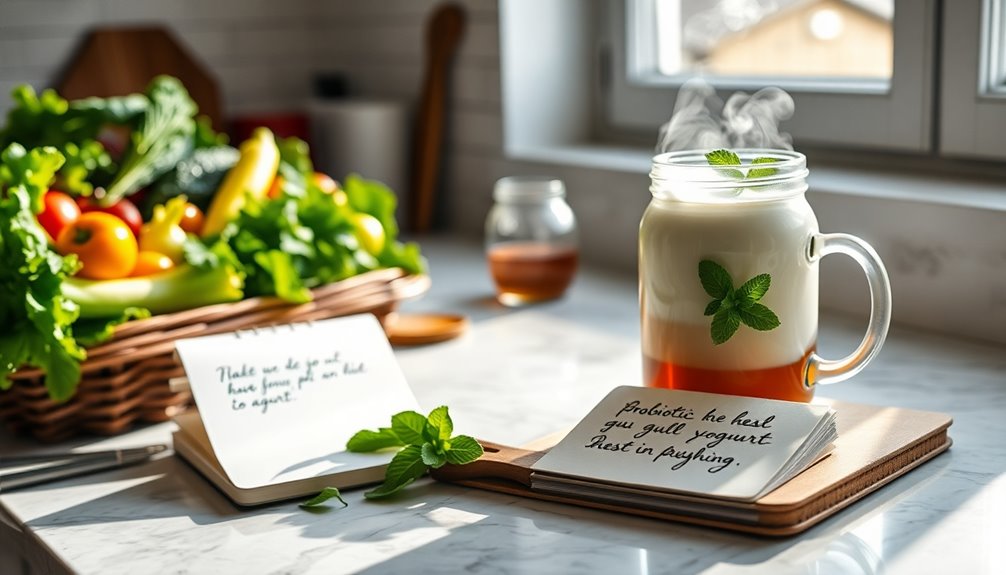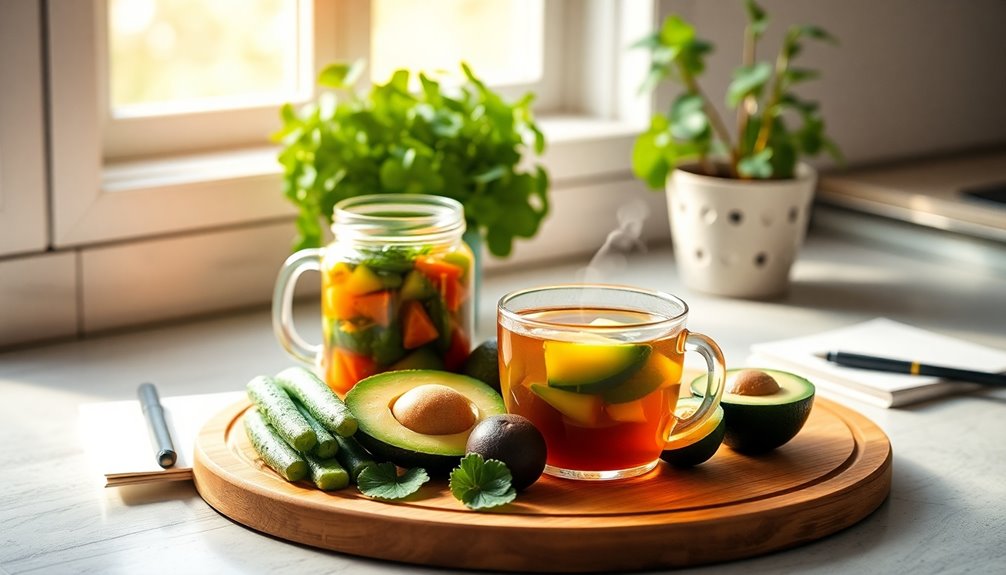To reduce bloating, focus on better gut habits that support digestion. Start by staying hydrated, as water helps your digestive system function smoothly. Incorporate probiotics through foods like yogurt or kefir; these beneficial bacteria can improve gut health. Eating smaller, more frequent meals can also ease pressure on your stomach. Be mindful of trigger foods that cause discomfort, and consider keeping a food diary. Finally, manage stress and engage in regular physical activity to bolster digestion. By implementing these strategies, you'll notice a difference in your bloating and overall gut well-being. There's even more to explore on this topic!
Key Takeaways
- Incorporate probiotic-rich foods like yogurt and kefir to balance gut microbiota and reduce bloating.
- Stay hydrated to support digestion and prevent constipation, which can contribute to bloating.
- Identify and eliminate trigger foods that may cause sensitivity, such as dairy or gluten, to minimize bloating.
- Include fermentable fibers in your diet to promote healthy gut bacteria and facilitate digestion.
- Engage in regular physical activity, including aerobic and strength training exercises, to enhance gut motility and reduce bloating.
Understand the Causes of Bloating

Understanding the causes of bloating can greatly enhance your digestive health. Bloating often stems from an imbalance in your gut microbiota, the community of microorganisms residing in your digestive tract. When this balance is disrupted, it can lead to excessive gas production and discomfort.
For instance, consuming certain foods, particularly those high in fermentable fibers, can overwhelm your gut microbiota, resulting in bloating.
Another pivotal factor is the role of digestive enzymes. These enzymes help break down the food you eat, making nutrients easier to absorb. When your body doesn't produce enough digestive enzymes, it can lead to incomplete digestion, which contributes to gas buildup. That's why understanding what affects enzyme production in your body is crucial. Factors like age, diet, and certain medical conditions can all impact enzyme levels.
You might find that tracking your diet helps you identify specific foods that trigger bloating. By recognizing these triggers, you can work towards creating a more balanced gut microbiota and supporting optimal enzyme function. This approach not only helps reduce bloating but also fosters a sense of belonging to a community that values digestive health.
Implementing small changes, like including more enzyme-rich foods or probiotics, can make a significant difference. Remember, each person's gut is unique, so what works for one mightn't work for another. Being patient and willing to experiment will ultimately lead you to a healthier, happier gut.
Stay Hydrated Daily

Staying hydrated daily is essential for maintaining a healthy gut and reducing bloating. When you drink enough water, it helps your digestive system function smoothly, flushing out waste and preventing constipation, which is a common cause of bloating. Plus, proper hydration can help reduce the retention of excess fluids that may lead to that uncomfortable, puffy feeling. Furthermore, an unhealthy liver can exacerbate issues like bloating, as it plays a vital role in regulating hormones and metabolizing nutrients.
Here are some hydrating tips to keep in mind:
- Set reminders: Use your phone or a hydration app to remind you to drink water throughout the day.
- Infuse your water: Add slices of fruits, herbs, or veggies to make your water more appealing and flavorful, encouraging you to drink more.
- Track your intake: Keep a journal or use an app to monitor your daily water intake, aiming for at least 8 cups (64 ounces) per day, or more if you're active.
Water intake suggestions may vary based on your activity level, climate, and individual needs. Listen to your body; if you feel thirsty, that's a sign you need to hydrate. Remember, while other beverages can contribute to your fluid intake, nothing beats plain water for hydration.
Incorporate Probiotics Into Your Diet

After maintaining proper hydration, the next step to support a healthy gut is incorporating probiotics into your diet. Probiotics are live bacteria that can offer numerous gut health benefits, aiding in the balance of your digestive system and reducing bloating.
You might wonder how to incorporate these beneficial bacteria into your meals, and the good news is there are several easy ways.
First, consider adding probiotic-rich foods like yogurt, kefir, sauerkraut, and kimchi to your diet. These fermented foods not only taste great but also naturally contain live cultures that promote gut health.
If you prefer a more convenient option, probiotic supplements can be an effective choice. They come in various forms, like capsules or powders, and can help make sure you're receiving an adequate dose of beneficial bacteria.
When selecting probiotic supplements, look for products that contain multiple strains of bacteria and have a high CFU (colony-forming unit) count. This variety can enhance the gut health benefits you receive. Additionally, incorporating mini bands into your routine can also help improve overall body strength and metabolism, further supporting gut health.
Eat Smaller, More Frequent Meals

Eating smaller, more frequent meals can greatly ease bloating and enhance your overall digestive health. By practicing portion control and adjusting your meal timing, you can help your gut process food more efficiently. This approach not only reduces the burden on your digestive system but also stabilizes your energy levels throughout the day.
Here are a few tips to help you get started:
- Plan your meals: Schedule your meals and snacks to make sure you're eating every three to four hours.
- Focus on portions: Aim for smaller portions that keep you satisfied without overwhelming your stomach.
- Listen to your body: Pay attention to hunger cues; eat when you're hungry and stop when you're full.
Research indicates that larger meals can lead to discomfort, making it harder for your body to digest food. When you eat smaller, more frequent meals, you allow your digestive system to work more effectively, reducing the chances of bloating. Plus, this method encourages you to include a variety of foods into your diet, which can help nourish your gut microbiome.
Making this shift may feel challenging at first, but you'll likely find that your body responds positively. Remember, it's about creating sustainable habits that make you feel better. By embracing smaller, frequent meals, you're not just improving your digestion—you're also fostering a sense of well-being and connection with your body.
Identify and Avoid Trigger Foods

Alongside adjusting meal frequency, identifying and avoiding trigger foods can greatly improve your digestive health and reduce bloating. Many people experience food sensitivities that can lead to uncomfortable symptoms. The first step in addressing these issues is adopting an elimination diet.
This involves removing common triggers—like dairy, gluten, and certain sugars—then gradually reintroducing them to identify which ones cause bloating.
As you navigate this process, practice mindful eating. Pay attention to how different foods affect your body. Keeping a food journal can be incredibly helpful; jot down what you eat and any symptoms that follow. This not only helps you pinpoint problematic foods but also encourages portion control.
Eating smaller amounts can ease digestion, making it simpler to identify which foods are safe for you.
Once you've identified your trigger foods, it's crucial to avoid them as much as possible. This doesn't mean you can't enjoy your meals; it simply means being mindful of what works for your body. Surround yourself with supportive friends or family who understand your dietary needs, as they can help create an environment that promotes better eating habits.
Manage Stress Effectively

Managing stress effectively is essential for maintaining a healthy gut and reducing bloating. When you're stressed, your body produces more cortisol, which can hinder digestion and lead to discomfort. Luckily, there are practical strategies you can implement to manage stress and support your gut health.
Start by incorporating mindfulness techniques into your daily routine. These practices can help you stay present and calm, which may reduce stress-related bloating. Here are a few ideas to get you started:
- Meditation: Spend just a few minutes each day focusing on your breath and letting go of distractions.
- Journaling: Write down your thoughts and feelings to help process your emotions and identify stressors.
- Nature Walks: Spend time outdoors to reconnect with your surroundings and reduce anxiety.
Breathing exercises are another powerful tool. Deep, controlled breaths can activate your body's relaxation response, countering the effects of stress. Try taking slow, deep breaths for a few minutes each day.
Inhale deeply for a count of four, hold for four, then exhale for four. This simple practice not only calms your mind but also aids digestion. Additionally, practicing diaphragmatic breathing can significantly enhance your ability to manage stress and promote gut health.
Regular Physical Activity

Engaging in regular physical activity can greatly enhance your gut health and help alleviate bloating. Exercise benefits go beyond just physical fitness; they play a pivotal role in maintaining a healthy digestive system. When you move your body, whether it's through walking, dancing, or more intense workouts, you stimulate the gut, promoting better digestion and reducing gas buildup that can lead to discomfort. Additionally, maintaining a healthy balance of gut bacteria is crucial for overall well-being.
Incorporating consistent exercise into your routine can significantly impact your overall well-being. Here's a quick overview of how different types of physical activities contribute to gut health:
| Type of Exercise | Benefits for Gut Health | Recommended Frequency |
|---|---|---|
| Aerobic Exercise | Increases blood flow and supports digestion | 150 minutes/week |
| Strength Training | Builds muscle, improves metabolism, and aids digestion | 2-3 times/week |
| Flexibility Work | Reduces stress and tension in the gut | Daily or as needed |
As you can see, a mix of these activities not only helps with bloating but also fosters a sense of community and belonging when done in groups. Whether you join a local run club, attend a yoga class, or simply take a stroll with friends, you're not just working on your gut health; you're also connecting with others who share your journey.
Frequently Asked Questions
How Long Does It Take to See Improvements in Bloating?
You might wonder how long it takes to see improvements in bloating. Typically, a bloating timeline varies from person to person, but many notice changes within a few days to weeks. If you focus on enhancing your gut health, such as adjusting your diet or incorporating probiotics, you could experience relief faster.
Can Certain Medications Contribute to Bloating?
Imagine your gut's like a symphony orchestra, where each medication plays a part. Sometimes, certain medications can disrupt this harmony, leading to bloating. Research shows that some drugs, especially antibiotics or pain relievers, can alter gut health, causing imbalances.
If you've noticed bloating after starting a new medication, it's worth discussing with your doctor. Understanding the gut health relationship with medication effects can help you find the right balance for your well-being.
Is Bloating a Sign of a More Serious Condition?
Bloating can sometimes signal a more serious condition, especially if the severity is high or it's accompanied by other symptoms like pain or weight loss. It's important to take into account any underlying conditions that could be causing your discomfort.
If you notice persistent or worsening bloating, it's best to consult a healthcare professional. They can help you understand the root causes and explore potential solutions, ensuring you feel supported and informed.
Are There Specific Foods That Help Reduce Bloating?
Yes, certain foods can help ease bloating.
You should consider incorporating probiotic-rich foods like yogurt and kefir, as they promote a healthy gut microbiome.
Additionally, foods containing digestive enzymes, such as pineapple and papaya, can aid in breaking down food and reducing gas.
Staying hydrated and avoiding overly processed foods can also make a difference.
What Are Some Natural Remedies for Bloating Relief?
Imagine sipping a warm cup of herbal tea, its soothing aroma wrapping around you like a comforting hug.
You can find relief from bloating with remedies like ginger or peppermint tea. They're known for their digestive benefits.
Additionally, digestive enzymes can aid in breaking down food, making digestion smoother.
Embracing these natural options not only helps you feel better but also connects you with a community that values wellness and self-care.
Conclusion
By embracing these gut-friendly habits, you can say goodbye to bloating and hello to comfort, much like finding a long-lost treasure map. Remember, staying hydrated, incorporating probiotics, and managing stress can work wonders for your digestive health. As you navigate your dietary choices with care, you'll uncover a happier gut, just as Odysseus discovered his way home. So, take these steps, and let your body thank you for the newfound ease and energy!



